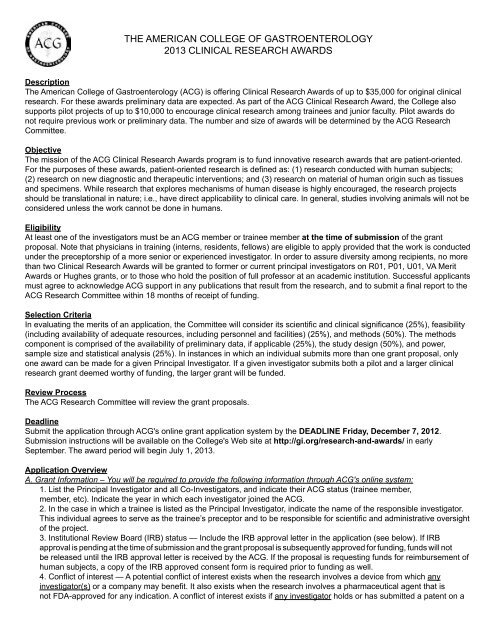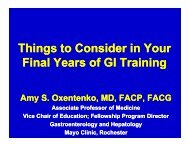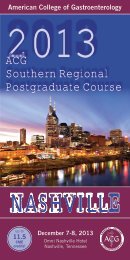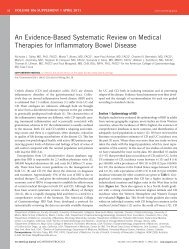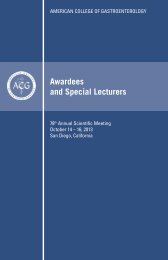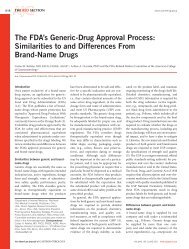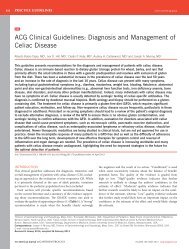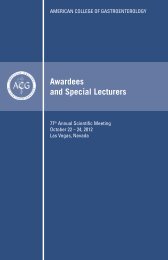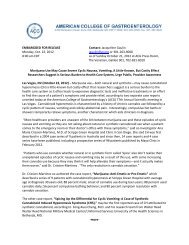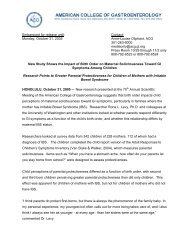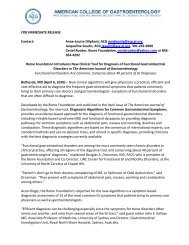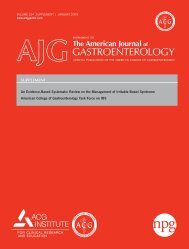ACG Clinical Research Award
ACG Clinical Research Award
ACG Clinical Research Award
Create successful ePaper yourself
Turn your PDF publications into a flip-book with our unique Google optimized e-Paper software.
THE AMERICAN COLLEGE OF GASTROENTEROLOGY<br />
2013 CLINICAL RESEARCH AWARDS<br />
Description<br />
The American College of Gastroenterology (<strong>ACG</strong>) is offering <strong>Clinical</strong> <strong>Research</strong> <strong>Award</strong>s of up to $35,000 for original clinical<br />
research. For these awards preliminary data are expected. As part of the <strong>ACG</strong> <strong>Clinical</strong> <strong>Research</strong> <strong>Award</strong>, the College also<br />
supports pilot projects of up to $10,000 to encourage clinical research among trainees and junior faculty. Pilot awards do<br />
not require previous work or preliminary data. The number and size of awards will be determined by the <strong>ACG</strong> <strong>Research</strong><br />
Committee.<br />
Objective<br />
The mission of the <strong>ACG</strong> <strong>Clinical</strong> <strong>Research</strong> <strong>Award</strong>s program is to fund innovative research awards that are patient-oriented.<br />
For the purposes of these awards, patient-oriented research is defined as: (1) research conducted with human subjects;<br />
(2) research on new diagnostic and therapeutic interventions; and (3) research on material of human origin such as tissues<br />
and specimens. While research that explores mechanisms of human disease is highly encouraged, the research projects<br />
should be translational in nature; i.e., have direct applicability to clinical care. In general, studies involving animals will not be<br />
considered unless the work cannot be done in humans.<br />
Eligibility<br />
At least one of the investigators must be an <strong>ACG</strong> member or trainee member at the time of submission of the grant<br />
proposal. Note that physicians in training (interns, residents, fellows) are eligible to apply provided that the work is conducted<br />
under the preceptorship of a more senior or experienced investigator. In order to assure diversity among recipients, no more<br />
than two <strong>Clinical</strong> <strong>Research</strong> <strong>Award</strong>s will be granted to former or current principal investigators on R01, P01, U01, VA Merit<br />
<strong>Award</strong>s or Hughes grants, or to those who hold the position of full professor at an academic institution. Successful applicants<br />
must agree to acknowledge <strong>ACG</strong> support in any publications that result from the research, and to submit a final report to the<br />
<strong>ACG</strong> <strong>Research</strong> Committee within 18 months of receipt of funding.<br />
Selection Criteria<br />
In evaluating the merits of an application, the Committee will consider its scientific and clinical significance (25%), feasibility<br />
(including availability of adequate resources, including personnel and facilities) (25%), and methods (50%). The methods<br />
component is comprised of the availability of preliminary data, if applicable (25%), the study design (50%), and power,<br />
sample size and statistical analysis (25%). In instances in which an individual submits more than one grant proposal, only<br />
one award can be made for a given Principal Investigator. If a given investigator submits both a pilot and a larger clinical<br />
research grant deemed worthy of funding, the larger grant will be funded.<br />
Review Process<br />
The <strong>ACG</strong> <strong>Research</strong> Committee will review the grant proposals.<br />
Deadline<br />
Submit the application through <strong>ACG</strong>'s online grant application system by the DEADLINE Friday, December 7, 2012.<br />
Submission instructions will be available on the College's Web site at http://gi.org/research-and-awards/ in early<br />
September. The award period will begin July 1, 2013.<br />
Application Overview<br />
A. Grant Information – You will be required to provide the following information through <strong>ACG</strong>'s online system:<br />
1. List the Principal Investigator and all Co-Investigators, and indicate their <strong>ACG</strong> status (trainee member,<br />
member, etc). Indicate the year in which each investigator joined the <strong>ACG</strong>.<br />
2. In the case in which a trainee is listed as the Principal Investigator, indicate the name of the responsible investigator.<br />
This individual agrees to serve as the trainee’s preceptor and to be responsible for scientific and administrative oversight<br />
of the project.<br />
3. Institutional Review Board (IRB) status — Include the IRB approval letter in the application (see below). If IRB<br />
approval is pending at the time of submission and the grant proposal is subsequently approved for funding, funds will not<br />
be released until the IRB approval letter is received by the <strong>ACG</strong>. If the proposal is requesting funds for reimbursement of<br />
human subjects, a copy of the IRB approved consent form is required prior to funding as well.<br />
4. Conflict of interest — A potential conflict of interest exists when the research involves a device from which any<br />
investigator(s) or a company may benefit. It also exists when the research involves a pharmaceutical agent that is<br />
not FDA-approved for any indication. A conflict of interest exists if any investigator holds or has submitted a patent on a
device or pharmaceutical agent or is a major share-holder in a company involved in the research. If applicable, attach<br />
a detailed letter of explanation (see below).<br />
B. Abstract<br />
You will be asked to submit an abstract of no more than 350 words. Use the abstract to summarize the proposed<br />
research.<br />
C. <strong>Research</strong> Grant Proposal<br />
Applicants are required to submit the following elements for their application. Documents can be uploaded through<br />
the online system, but must be formatted using 1" margins and a font no smaller than 11 point. For uploaded<br />
documents, put your name (last name, first name) and the name of the award in the upper right hand corner of each<br />
page. Limit to 5 pages (excluding references and budget). FAILURE TO ADHERE TO THESE INSTRUCTIONS<br />
WILL CAUSE THE GRANT APPLICATION TO BE RETURNED UNREVIEWED.<br />
Specific Aims — Provide a clear description of the study objectives. Consider the following questions:<br />
What is the hypothesis to be addressed What are the immediate objectives What are the ultimate<br />
objectives How does the proposed research fit into an overall research program<br />
Background/Significance — State how the proposed work bears on prior work and indicate how it will<br />
extend the boundaries of current knowledge.<br />
Pilot Data/Previous Work — For larger grant proposals (defined as >$10,000) pilot data/previous work is<br />
expected. Pilot awards of


